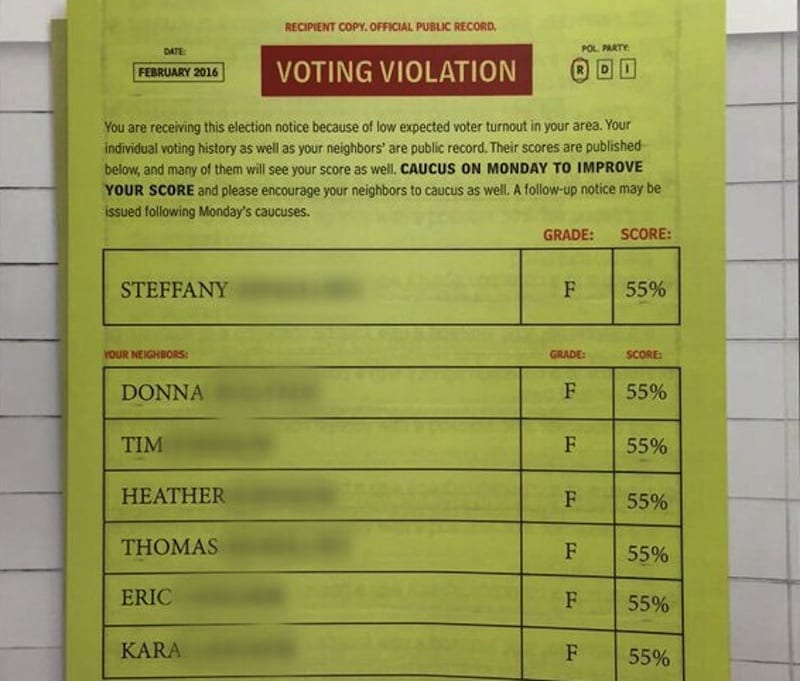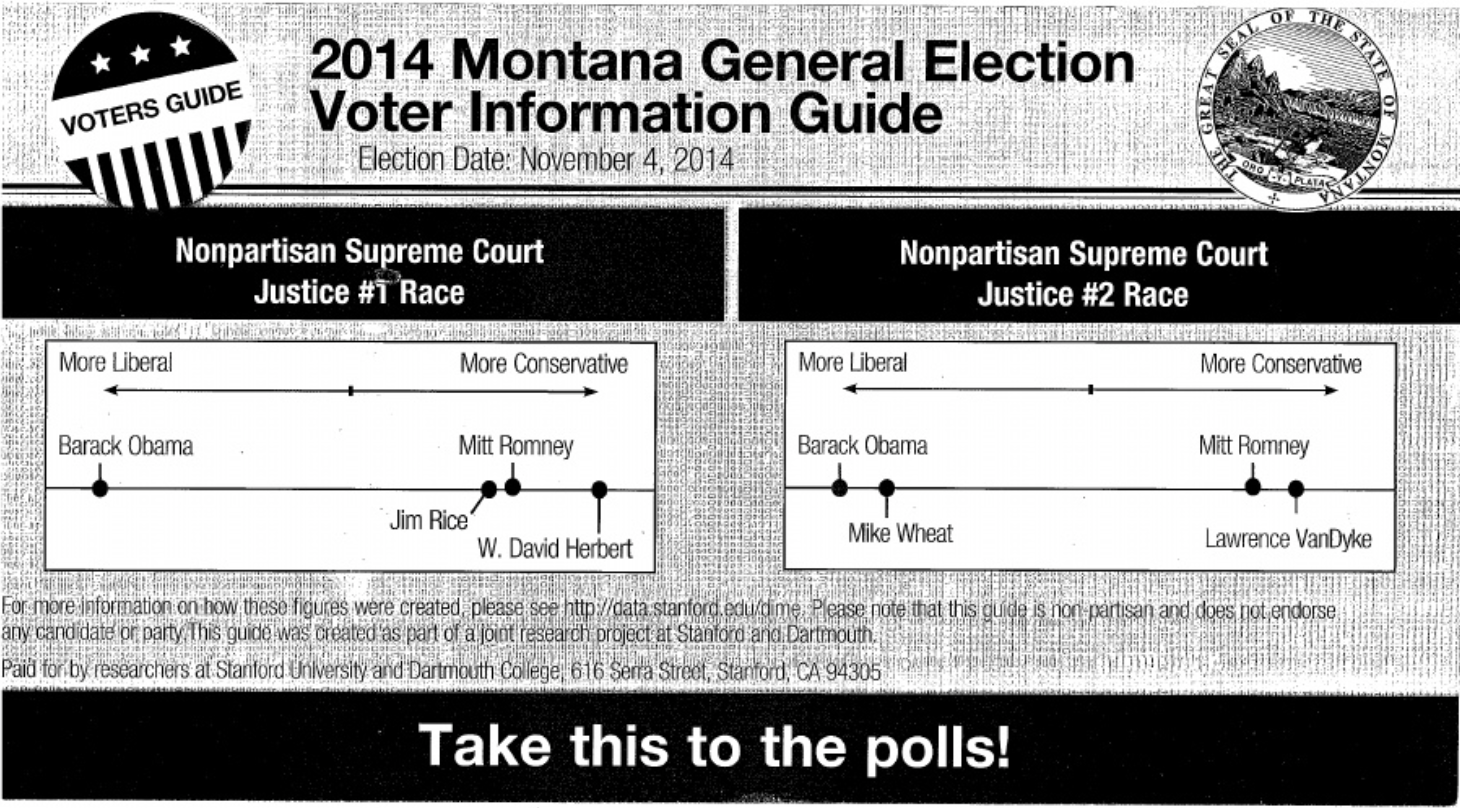In an amusing alignment of political and academic scandals, presidential candidate Ted Cruz was blasted for sending prospective voters in the Iowa Caucus this misleading mailer:

Which reminds me of the uproar two years ago when a couple of Stanford political science professors sent prospective Montana voters this misleading mailer:

I don’t know which is worse: having a “voting violation” in Iowa or being almost as far left as Barack Obama in Montana.
There is well known research in political science suggesting that shaming people can motivate them to come out and vote, so I can understand how Cruz can describe this sort of tactic as “routine.”
It’s interesting, though: In 2014, some political scientists got into trouble by using campaign-style tactics in a nonpartisan election (and also for misleading potential voters by sending them material with the Montana state seal). In 2016, a political candidate is getting into trouble by using political-science-research tactics in a partisan election (and also for misleading potential voters with a “VOTING VIOLATION” note).
What’s the difference between Ted Cruz and a Stanford political scientist?
Some people wrote to me questioning the link I’m drawing above between Cruz and the Stanford political scientists. So let me emphasize that I know of no connections here. I don’t even know if Cruz has any political scientists on his staff, and I’m certainly not trying to suggest that the Stanford profs in question are working for Cruz or for any other presidential candidate. I have no idea. Nor would I think it a problem if they are. I was merely drawing attention to the similarities between Cruz’s item and the Montana mailer from a couple years back.
I do think what Cruz did is comparable to what the political scientists did.
There are some differences:
1. Different goals: Cruz wants to win an election, the political scientists wanted to do research.
2. Different time frames: Cruz is in a hurry and got sloppy, the political scientists had more time and could be more careful with the information on their mailers.
But I see two big similarities:
1. Research-based manipulation of voters: Cruz is working off of the effects of social pressure on turnout, the political scientists were working off the effects of perceived ideology on turnout.
2. Misleading information: Cruz is implying that people have some sort of obligation to vote, the political scientists were implying that their mailer was coming from the State of Montana.
My sense was that the political scientists caught a lot of flack because they were manipulating elections by providing misleading information for research purposes. Campaigns or parties manipulating elections by providing misleading information is basically the nature of American Democracy.
This is a point that has come up before in various ways on the blog – just because something is legal and can be done by some people doesn’t make it OK for scientists to do it for research purposes. I mean, if someone wanted to they could walk around screaming abuse at homeless people about how they should just get a f***ing job and stop being lazy (in fact, some people probably do this and probably shouldn’t be arrested). But if a researcher randomly assigned abuse and documented the mental state of the “subjects” for research purposes – say, to test whether “tough love” policies have psychological effects – I would hope their University would fire them for unethical research practices.
I’m not exactly arguing that scientists should be held to *higher* standards than those the public are held to in their day-to-day lives. I’m just arguing that what people do in the name of science is, and should be, held to *different* standards, and that “legality” is not the only standard that matters for research ethics.
Jrc:
Interesting that you should say this, because a political scientist who read this post sent me an email making the opposite point, that the Cruz mailer was particularly bad and that political science had nothing to do with it. But from my perspective, political science did have something to do with it: the Cruz campaign was just following some version of the political science playbook on increasing voter turnout.
If we as political scientists write papers on how to manipulate voters, and if we as political scientists consult for campaigns and give them advice on how to manipulate voters, we can hardly be surprised if campaigns start doing it on their own.
Maybe this? or something like it?
From outside academia: this is a partisan and/or political story.
From inside the field: the interesting question is whether Cruz is playing within the rules of the game, whether it is OK to do that in politics (and if it is not OK, then it does not come from political science, it comes from criminality).
From outside the field but inside social science academia: the interesting questions are about the ethics of experimenting on people in this manner (in terms of deception, scale, and the importance of elections).
I think people are going to see this from the perspective most natural to them given their vantage point, and then, within that, make their arguments. But because of this it is hard for me to understand the context of your colleague’s argument, so I just guess that it has to do with some idea of exactly how blatantly a candidate should be allowed manipulate the public and what “political science” thinks of that. I really don’t have any expertise on the norms or laws here, but I think it is clear that both: a) candidates and campaigns do manipulate information all the time; and b) there is such a thing as going too far.
Or maybe I’m totally off here and I’m just the only one whose first reaction to that original story was “maybe they shouldn’t have done that” and whose reaction to this story was “of course they did that”.
Leaving aside questions of legality and ethics, there is another problem with research methods that are manipulative. In order for science to advance the well being of humanity, it is important that it be perceived as, not infallible, but at least honest and usually credible. If we engage in deceptive manipulations as part of our methods, we damage the reputation of science as a whole. Why should people believe, for example, the climate science community’s claims, if scientists routinely engaged in deception? (I’m not saying deception is actually routine in science–I think it is rare–I’m just raising a hypothetical.)
Of course, there are some scientific questions that, for practical purposes, cannot be investigated without engaging in some kind of deception. But in those circumstances, the deception typically can and should be limited and time, with full disclosure to the participants as soon as the experiment is over. Moreover the deception should be carried out in such a way that nobody is harmed by it. But beyond these very limited circumstances and these guidelines for how it is done, we should avoid deceptive practices in research.
As scientists, our reputations for integrity are our most important asset. We should not do things that jeopardize it.
In something like Climate Science, I agree with you. Practitioners there have a duty to avoid deception and I don’t see too many hurdles why it can’t be done if you want to really do it.
OTOH, for certain other cases the problem of deception seems harder: e.g. If you are studying something like advertising or marketing or design, to some extent isn’t deception a tool you employ a lot?
So also if you are a Poli. Sci. Prof. advising a campaign. There could be a lot of things that might be construed as deception in what you do?
>>> “the interesting question is whether Cruz is playing within the rules of the game”
…which leads to the question of ‘What are the Rules of the Game'(?) (and who makes them?)
…this then leads to the fundamental questions about “Political Science” itself.
What is the purpose of political science? Why does it exist?
If the purpose is to gain knowledge — who is supposed to use that knowledge and to what end?